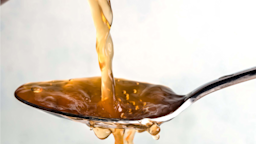Key takeaways:
Apple cider vinegar has prebiotic and probiotics. These help support a healthy microbiome, which is known to improve gut health.
There’s very limited scientific evidence showing that apple cider vinegar helps with bloating.
Apple cider vinegar is likely safe in moderation. But it may have some unwanted side effects, like digestive tract irritation and tooth enamel damage.
People are turning to apple cider vinegar these days as treatment for many different ailments. But it receives particular attention for its supposed benefits for gut health. So, it’s natural to wonder, could apple cider vinegar offer relief for the common discomforts of bloating? Many people swear by it. But the research tells a different story.
How does apple cider vinegar affect the stomach and gut?
Apple cider vinegar contains both prebiotic and probiotic properties. This means it nourishes and boosts the growth of beneficial bacteria in your gut. This is called your gut microbiome. These good bacteria help with digestion and play a crucial role in defending your body against harmful invaders that can cause illness, like viruses and bacteria. Maintaining a healthy gut microbiome is essential for supporting a strong immune system.
There aren’t a lot of scientific studies on the impact of apple cider vinegar on humans. However, some small studies on animals show a possible effect of apple cider vinegar on the stomach. One study found that when fish were on a diet supplemented with apple cider vinegar, their digestive enzymes were better at breaking down food. There’s no way to draw conclusions on whether or not apple cider vinegar works the same way in humans. But it has sparked curiosity around whether or not it might help prevent symptoms of indigestion, like bloating.
Search and compare options
What does the research say about apple cider vinegar and bloating?
People often report that apple cider vinegar helps them with bloating. This is based on anecdotal evidence, not scientific evidence.
It makes sense why someone would think that apple cider vinegar helps with bloating. Your stomach uses acid to help digest your food, and apple cider vinegar is an acid, too. It’s also antimicrobial. This means it can kill off bad bacteria, similar to the way your gut can. But there’s not enough evidence to know how or if apple cider vinegar changes digestion.
The limited research on apple cider vinegar and bloating is mixed. There’s some evidence that apple cider vinegar helps balance gut bacteria. The prebiotics and probiotics in apple cider vinegar support the growth of good bacteria in the gut, optimizing how your body extracts nutrients from food. When the gut microbiome is balanced, the digestive system operates smoothly, and bloating may go away.
However, other studies show apple cider vinegar delays gastric emptying. This means it slows down the digestive system and could make bloating worse.
So, in the end, we can’t draw any conclusions about how apple cider vinegar affects bloating. If you still want to give it a try, be sure to first understand the potential negative side effects.
What are the side effects and risks of apple cider vinegar?
Even though there’s little evidence to suggest apple cider vinegar helps with bloating, some people are still curious to try it out for themselves. Apple cider vinegar is generally safe, but there are some things to watch out for:
Stomach issues: It can cause stomach pain or nausea in some people, especially if you have acid reflux. Acidic foods, like apple cider vinegar, may increase symptoms of reflux, causing some pain or nausea.
Digestive problems: Apple cider vinegar can irritate the intestine. Drinking too much of it could cause diarrhea or increase bloating and gas.
Tooth enamel damage: Since apple cider vinegar is really acidic, drinking it can wear away your enamel. This can make your teeth more sensitive and vulnerable to decay.
Throat irritation: Drinking apple cider vinegar — especially without diluting it — can hurt your throat.
Read more like this
Explore these related articles, suggested for readers like you.
It’s also important to note that apple cider vinegar may lower blood sugar and potassium levels. This means:
If you’re taking medication for diabetes, you could experience a dangerous dip in blood sugar.
If you take medications that lower potassium, like diuretics or digoxin, you could be at risk for low potassium. This can cause weakness and irregular heartbeat, among other symptoms.
When is the best time to drink apple cider vinegar?
Given the lack of research on the health benefits of apple cider vinegar, the ideal time to drink it is unknown.
Some people choose to drink apple cider vinegar before meals to potentially help with digestion — or in the morning on an empty stomach to jumpstart metabolism. Alternatively, it can be diluted in water and consumed throughout the day or before bedtime to possibly facilitate better digestion overnight.
There is no research on expert guidance on this. So, if you want to give apple cider vinegar a try, listen to your body and see what works best for you.
The bottom line
It’s unclear if apple cider vinegar can help with bloating. Many people report that it’s helpful for them. But the research hasn’t shown any clear benefit. If you want to give it a try, do so in moderation. This way you can avoid any potential side effects. Since there’s no clear guidance on the best way to use it, do what feels best for you. But don’t rely on apple cider vinegar to treat digestive issues. If you’re experiencing frequent symptoms — like bloating or otherwise — it’s best to talk to a healthcare professional.

Why trust our experts?


References
Ahmadniaye Motlagh, H., et al. (2019). Supplementation of dietary apple cider vinegar as an organic acidifier on the growth performance, digestive enzymes and mucosal immunity of green terror (andinoacara rivulatus).
Ahuja, A., et al. (2019). Popular remedies for esophageal symptoms: A critical appraisal. Current Gastroenterology Reports.
Hamm, L. L., et al. (2013). Acid-base and potassium homeostasis. Seminars in Nephrology.
Hlebowicz, J., et al. (2007). Effect of apple cider vinegar on delayed gastric emptying in patients with type 1 diabetes mellitus: A pilot study. BMC Gastroenterology.
Humayun, A. (2019). Effect of apple cider vinegar on glycemic control, hyperlipidemia, and control on body weight in type 2 diabetes patients.
Saqib, A. (2017). Antimicrobial activity of apple cider vinegar. Mapana Journal of Sciences.
Schmulson, M., et al. (2011). Review article: The treatment of functional abdominal bloating and distension. Aliment Pharmacology and Therapeutics.


















